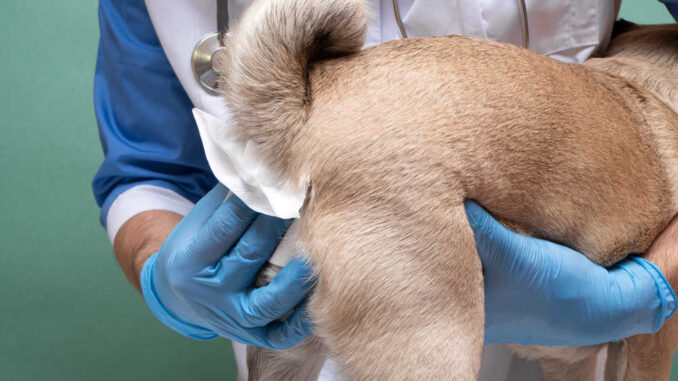
This article was updated on August 26th, 2023
While we share a lot of the same anatomy with our furry family members, there are a few major differences – for example, anal glands! These small sacs are located under the surface of the skin on either side of your dog’s anus at approximately the four and eight o’clock positions. They normally range from the size of a pea to a grape. During defecation, the glands are squeezed, releasing a fishy-smelling fluid that provides lubrication and helps mark their territory. Anal glands can be released at other times as well, such as during stress or excitement. It is also possible for these glands to become infected, abscess, or even rupture. A smelly fluid leaking from your dog’s behind, excessive licking or chewing in that area, and butt-scooting across the floor can all be signs of an anal gland issue. Here’s what pet parents should know.
Anal gland leakage in dogs: what does it mean?
Anal gland leakage is the release of a fishy-smelling liquid from your dog’s anal glands. This can be completely normal; for example, many dogs will release their anal glands if they are frightened. It also happens when your dog defecates, as their feces push on the anal glands from the inside. However, frequent anal gland leakage can also be a sign of a medical issue – either one affecting your dog’s feces, ability to defecate, or a problem with the anal glands themselves.
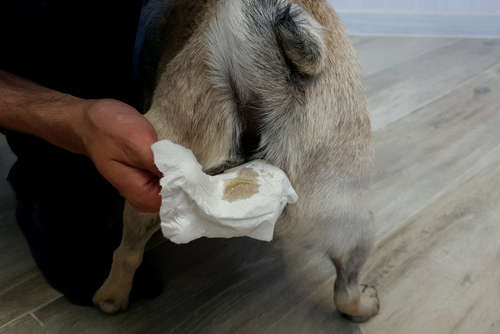
Why do anal glands leak?
If your dog’s anal glands are leaking, it could be due to a variety of reasons.
Full anal glands
The simplest explanation may be that your dog’s anal glands are overly full. This could be a one-time thing or indicative of an underlying issue, like those discussed below. If you already attempted to have your dog’s anal glands expressed by a groomer or did so yourself at home, there may still be anal gland fluid left. Your vet can perform a rectal exam and more thoroughly express the anal glands.
Anal gland infection or abscess
These conditions can occur if the anal gland ducts become clogged, leading to fluid buildup (impaction) and colonization by bacteria (infection). An abscess is a painful swelling containing bacteria and pus, which can sometimes rupture or burst. In addition to leakage, common signs of anal gland infection or abscess include:
- Scooting the bottom on the ground
- Excessive licking or chewing around the anus or base of the tail
- Swelling or redness around the anus
- Discharge (blood and/or pus) or matted fur around the anus
- Reluctance to poop
- Expression of a thick, dark brown, or green discharge from the anal glands
- Other signs of pain, such as crying, yelping, whimpering, or aggression
- Other signs of illness such as lethargy and decreased appetite
In most cases, your vet can diagnose an anal gland infection or abscess based on history and physical exam (including a rectal exam). Treatment will vary but may include expression and flushing of the affected anal gland(s), medications such as antibiotics and anti-inflammatories, and in some cases, surgery. If an anal gland abscess has not ruptured on its own, your vet may recommend a small surgical procedure to help it drain. For dogs with severe or recurrent anal gland issues, surgery to remove the anal glands may be considered.
Changes to your dog’s stool or diet
The appearance and consistency of your dog’s poop can vary greatly depending on numerous factors, including their diet. If anal gland leakage occurs after a recent change in diet, this could be the culprit. Additionally, if your dog is suffering from diarrhea, they may not be able to fully express their anal glands during defecation. Whether it’s a simple case of dietary indiscretion causing loose stool or something more serious, management will involve determining and treating the underlying cause.
Stress
It is normal for dogs to express their anal glands if they are stressed or frightened. We see this a lot at the vet clinic. While in many cases this is unavoidable, providing your furry family member with a safe environment and plenty of enrichment is important. You could also consider calming supplements such as Adaptil or Composure chews, or in more severe cases, prescription medications to help manage anxiety.
Other
Other medical conditions can also affect your dog’s ability to empty their anal glands. Allergies have anecdotally been linked to anal gland issues. If your dog has trouble posturing to defecate due to pain from arthritis, this could be another contributing factor. Additionally, cancer of the anal glands, such as adenocarcinoma, is also a possible cause of persistent anal gland leakage.
How to stop anal glands from leaking – at-home care and product recommendations
As discussed above, anal glands can leak for a variety of reasons. If this issue is ongoing or bothersome (for you OR your dog), it is best to see a veterinarian for a thorough exam. Once the underlying cause is determined, they will be able to best guide you toward appropriate treatment options. If your dog is showing signs of discomfort such as scooting, pain during defecation, diarrhea or constipation, or excessive licking and chewing around the anus, it is important to get them evaluated right away. If the only clinical sign that you notice is the leaking of a fishy-smelling liquid, then you could consider trying these things at home first.
Express your dog’s anal glands
If your dog’s anal glands are leaking, they may be overly full. While some dogs never have any issues with their anal glands, others need to have them expressed on a regular basis. It is best to have your dog’s anal glands expressed by your veterinary team. This will ensure that everybody involved stays safe (even the sweetest dogs can bite if they are in pain), and the glands are expressed fully without causing additional pain or inflammation to the area. Your vet will express your dog’s anal glands internally during a rectal exam. Some groomers and pet parents are also able to express the anal glands externally.
Keep your dog at a healthy body weight
Dogs who are obese are at higher risk for developing anal gland issues, as well as other medical conditions such as arthritis and diabetes. You can keep your dog at an appropriate body weight by learning how to monitor their body condition score, feeding an appropriate amount of food, cutting back on treats or using lower calorie options, and increasing exercise.
Improve gut health
Dogs experiencing diarrhea or constipation may struggle to empty their anal glands, which can result in an infection or abscess. To prevent this, it’s important to maintain a consistent diet and avoid overfeeding treats or table scraps. Additionally, administering a probiotic like Fortiflora can help. It’s also recommended to give your dog a monthly preventative to safeguard against intestinal parasites.
Increase fiber intake
Including fiber in your dog’s diet can assist in bulking up stool and encouraging the natural emptying of anal glands during defecation. It can also support gastrointestinal health and help maintain an appropriate body weight. To incorporate more fiber into your dog’s diet, consider the following options:
- Canned pumpkin (not pumpkin pie filling) – work your way up to approximately 1-2 teaspoons per meal for small and medium dogs and 1 tablespoon per meal for large dogs. Too much may cause diarrhea. Read our veterinarian article: Is pumpkin a miracle food for anal gland issues? by Dr. Debra Eldredge.
- Metamucil – discuss dosage recommendations with your vet
- Glandex soft chews – These peanut butter-flavored chews contain fiber, probiotics, and digestive enzymes to help bulk up stool and promote GI health.
- Fiber capsules – These unflavored capsules are easy to administer and formulated for veterinary use.
Omega 3 fatty acids
Products such as fish oil have benefits for skin and joint health, as well as acting as a natural anti-inflammatory.
Use an e-collar
To prevent your dog from further inflammation and infection and promote healing, it’s advisable to put an e-collar on them to stop them from licking and chewing at their anus and tail base.
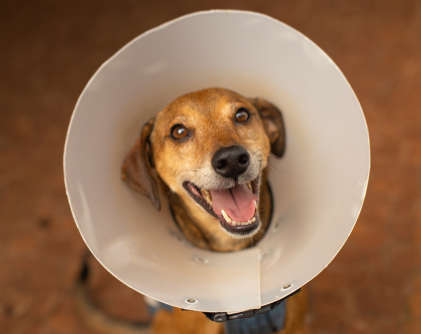
Apply a warm compress if your dog is ok with it
If your dog can handle it, you can try using a warm compress on the affected area for about five minutes two times a day. This may provide some relief and encourage the abscess to drain.
Manage any underlying medical conditions
Whether it’s underlying allergies, arthritis, or gastrointestinal issues, if there’s a medical issue contributing to your dog’s anal gland troubles it must be addressed.
How your vet can help
If your dog is showing signs of pain or discomfort related to their anal glands your vet can help. While not emergent, anal gland infections and abscesses can be incredibly painful. Additionally, if leakage has not resolved with the above at-home treatments discussed above, it is time to see your vet for a more in-depth workup.
Diagnostics
To diagnose an anal gland infection or abscess, your veterinarian will conduct a comprehensive physical examination, which includes a rectal exam. In certain circumstances, a bacterial culture or biopsy may be advised, especially in complex or severe cases, to eliminate other conditions like cancer. Additionally, blood work may be recommended to assess your dog’s general systemic health before surgery or administering specific medications. If your dog is experiencing diarrhea or gastrointestinal distress, your vet may suggest X-rays or an abdominal ultrasound.
Treatment options and likely costs
The cost of treatment will vary depending on the severity of the infection or other underlying issues. Simply having your vet express your dog’s anal glands may cost around $50. With additional testing and treatments, costs may be over $1000. This may include:
- Expression and flushing of the affected anal gland(s)
- Anti-inflammatories to help relieve pain and inflammation
- Antibiotics to treat infection
- Surgery to drain an abscess if the anal gland has not yet ruptured, or to remove the anal gland(s) in dogs with recurrent anal gland issues or anal gland cancer.
- Medications to manage other contributing causes, such as allergies and arthritis
Frequently Asked Questions
Are certain dog breeds more prone to anal gland leakage or anal gland issues in general?
Anal gland leakage can affect dogs of all breeds and ages. Risk factors may include obesity, changes in the consistency of the stool (such as constipation or diarrhea), frequent grooming, genetics, and other underlying medical conditions such as allergies or arthritis.
How can I prevent these problems from recurring?
Certain dogs may require regular expression of their anal glands. Ensuring your dog is in good health and promoting gastrointestinal health can also be advantageous.
Can anal gland leakage be a sign of a more serious health problem?
Anal gland leakage can be an indicator that the anal glands are overly full. This may be a random one-time occurrence or indicative of an underlying health issue, some of which can be serious.
How can I tell if my dog’s anal glands are impacted or infected?
Overly full, or impacted, anal glands are the first step in the progression of an anal gland infection developing. It is best to schedule an appointment to have your dog’s anal glands expressed at the first onset of clinical signs such as scooting, licking, or chewing around the anus. In many cases, this will help prevent a painful infection from developing and save on the cost of veterinary care as well.
Are there any complications associated with anal gland leakage in dogs?
Possibly, depending on the underlying cause. Anal gland infections are not life-threatening; however, they can be very painful and require prompt veterinary attention. In worst-case scenarios, an untreated infection can spread and damage other parts of the rectum or anus. Additionally, if leakage is due to another issue, such as cancer, the prognosis may not be as favorable.
Related posts:
Disclaimer: This website's content is not a substitute for veterinary care. Always consult with your veterinarian for healthcare decisions. Read More.


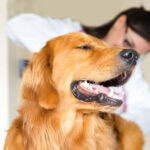
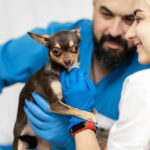
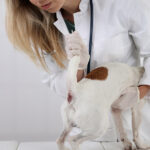
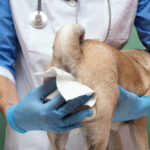
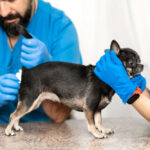

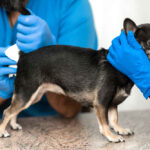


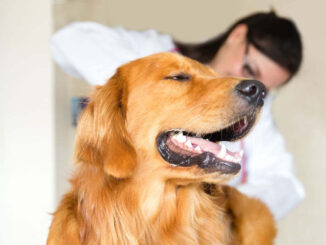
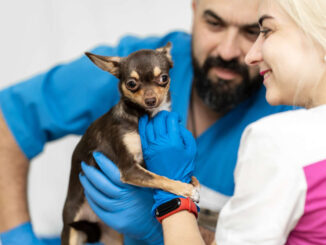
Be the first to comment